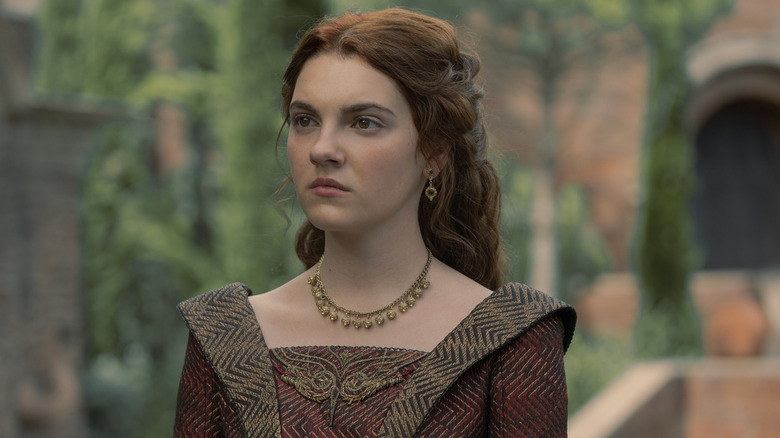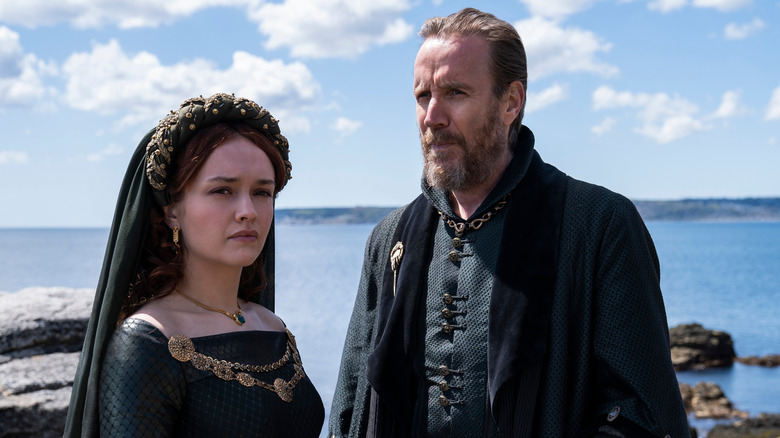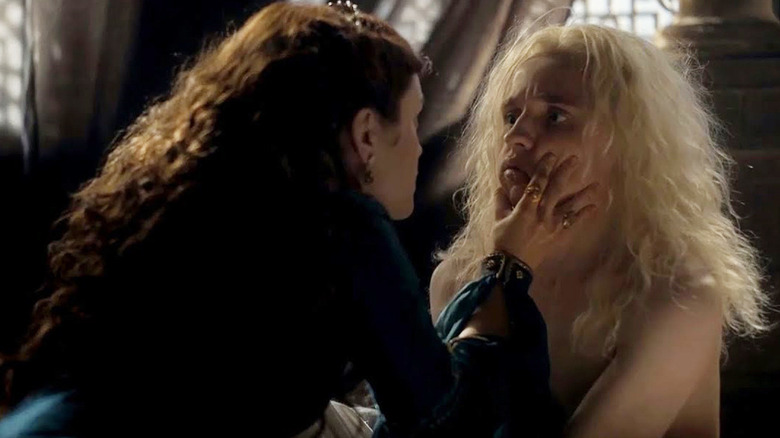Emily Carey Sees This As The 'Key' To Understanding House Of The Dragon's Hightowers
If you're looking to fill your quota for dragons, violence, and typical HBO debauchery, "House of the Dragon" more than has you covered. This Targaryen-centric show delves into all sorts of unpleasant territory, thanks to the blonde lunatics at the center of the drama. But just because they happen to be the primary agents of chaos, that doesn't mean that there aren't other dysfunctional families capable of wreaking havoc on the politics of Westeros. The other Houses may be less incestuous, but they're just as power-hungry and ready to go to great lengths to achieve their devious goals. Perhaps the best example is the family that's spent much of the season in a precariously powerful position: House Hightower.
For fans of this world who haven't read George R.R. Martin's "Fire & Blood," the Hightower family name isn't nearly as well-known as the Targaryens. Though occasionally mentioned in "Game of Thrones," they played a pretty small role overall: in one of Bran Stark's Tower of Joy flashbacks, we see a young Ned Stark facing off against Ser Gerold Hightower (Eddie Eyre), a member of the Kingsguard. There's also a vague mention that Margaery and Loras Tyrell have a Hightower mother, but for the most part, they exist as a peripheral, noble house.
Now their days of existing in the background have come to an end, because in "House of the Dragon" the Hightowers are front and center as crucial players in the game. It's Otto Hightower's (Rhys Ifans) ambitions that set this series in motion in the first place. He's helped out by some terrible decision-making from Paddy Considine's King Viserys, but it's hard to imagine the Targaryen family being quite so divided without Otto's prompting — especially when you consider his impact on his daughter, Queen Alicent (Emily Carey & Olivia Cooke).
The Hightower family values
Just because Otto forces his teenage daughter to marry the King, turns her against her best friend, and lets his own ambitions cloud his judgment doesn't mean the Hightowers are the villains of this story. I mean, Otto definitely is, but there might still be some hope for Alicent. Things are looking pretty dire as of late — she's gone from an obedient child plagued by anxiety to a bitter woman, ready to pluck a child's eye out if he poses a threat to her family — but she's not an uncomplicated character. Emily Carey, who played teenage Alicent, has some illuminating insights into what makes the Hightowers tick and how their family has come to reach a point of such desperation.
"The Hightowers are very passionate people," Carey explained during an interview with IndieWire. "Their sigil has a flame on it and I think that's poignant." It's not just the sigil, but their house words that reveal a lot about their place in the world: we light the way. They see themselves as a guiding light for the realm, and Alicent in particular feels bound to that duty. It's why she follows her father's instructions, gets close to the king, and eventually gets crowned as his Queen. Being pushed into this role and forced to "squeeze out heirs" ends up being terribly detrimental for Alicent's mental health. After losing her friendship with Rhaenyra (largely thanks to her father sowing seeds of doubt), she has nowhere else to turn. Otto is always an option when it comes to plotting success — but when it comes to showing any affection or even just having a normal conversation, he's basically useless.
Like father, like daughter
Carey elaborated:
"With Otto and Alicent, in all the scenes where they should be holding each other and crying and saying that they love each other, they don't — it's an argument. As soon as they feel some sort of vulnerability, immediately the wall goes up and they start to argue, but that's how they show each other love. It's a communication barrier, and I think that's key to the Hightowers in general."
As the role of Alicent has passed from Carey to Cooke, we're really seeing the full impact of her father's influence: not only in her grudge against her former friend, Princess Rhaenyra, but in the way she treats her own children. It's become even more distinct since Rhaenyra has joined her in motherhood: while the Princess shows outward affection to her children (kids who were born of a passionate, loving relationship), Alicent doesn't always do the same. This is especially true when it comes to her eldest son, Prince Aegon (Ty Tennant), who she saddles with the burden of one day ruling Westeros, the same way her father forced royal life onto her shoulders.
So while Alicent's relationship with Aegon is riddled with ridicule, slaps, and resentment, what will become of her relationship with Otto? If she resents her father for altering the course of her life this way, she has yet to voice it. In fact, she even admits to missing his presence at court and when the opportunity comes to get her back at his side, she takes it. There is a sort of tenderness between them — even if it mostly amounts to him assuring her that they will eventually prevail in their schemes — but given how much of this conflict goes back to Otto's personal ambitions, who's to say if they'll remain united front?


